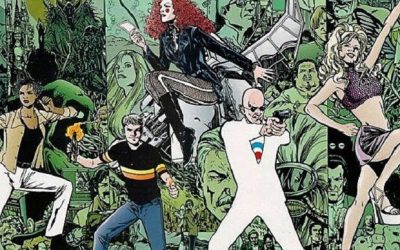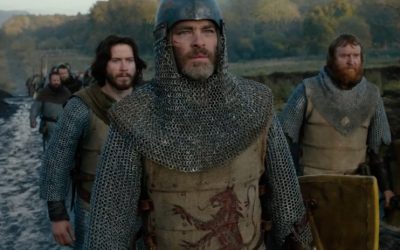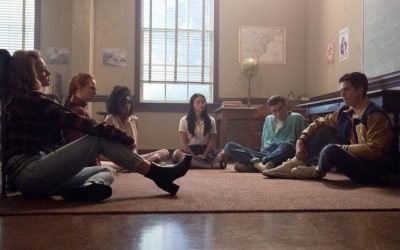
The Greatest Showman dominates 2018 UK home release chart
A new official UK film chart has been launched this week, and Hugh Jackman is riding high in 2018…
The Official Charts Company is moving with the times, and has finally launched an Official Film Chart in the UK this week, which brings together sales from digital downlads across the likes of Amazon and iTunes alongside physical media such as DVD, Blu-ray and 4K UHD. The results are already quite eye-opening, and we’ll make it our business to keep an eye on the weekly updates from now on. They’re set to be published every Wednesday, and will deliver a weekly Top 40.
Not a massive shock: The Greatest Showman is the biggest seller in 2018 to date, with Star Wars: The Last Jedi and Avengers: Infinity War trailing at positions 2 and 3 respectively.
Here’s the home release Top ten in 2018 so far, via Yahoo UK:
1. The Greatest Showman
2. Star Wars: The Last Jedi
3. Avengers: Infinity War
4. Paddington 2
5. Peter Rabbit
6. Jumanji: Welcome to the Jungle
7. Thor: Ragnarok
8. Black Panther
9. Deadpool 2
10. Kingsman: The Golden Circle
As you can see, Marvel has done very well when it comes to home releases in 2018, and there’s everything to play for on the run up to Christmas. It’s not surprising to see family fare in there, of course, but Kingsman: The Golden Circle is perhaps a bit of a surprise. Matthew Vaughn’s follow up to 2014’s Kingsman: The Secret Service was received with mixed reviews earlier in the year, but it made almost $411 million off a $104 million budget, so combined with its home release success, we can start to get a better idea of how a third film in the franchise has cracked along so quickly.
All the films languishing behind Hugh Jackman’s audience-winning loose musical biopic of P.T. Barnum’s success story will have to do very well to knock it off the 2018 charts, though – back in July, it had already broken the UK record for the most digital copies sold, with 1.4 million units shifted overall, 33% of those in digital format.
This week, Jurassic World: Fallen Kingdom is sitting atop the Top 40, but it still has some stiff competition from The Greatest Showman 43 weeks after its release.
Noughts + Crosses: cast announced for BBC’s alternate reality series
Filming is underway on the TV adaptation of Malorie Blackman’s book series, Noughts + Crosses…
Malorie Blackman’s award-winning Noughts + Crosses books are being adapted into a six-part TV series for BBC One, and the cast list and a first pic have now been released. Written by Toby Whithouse (Being Human), Lydia Adetunji (Riviera), Nathaniel Price (Tin Star) and Rachel De-Lahay (Kiri), the story is set in an alternate world where racism divides society.
Noughts + Crosses follows two young people Sephy and Callum, who are divided by their colour but united by love. Sephy is a ‘Cross,’ a member of the black ruling class and daughter of a prominent politician. Callum is a ‘Nought,’ a white member of the underclass. The two have been friends since early childhood but their relationship grows ever more complicated as they come of age. It’s the story of two families separated by power and prejudice but forever entwined by fate.
It’s been revealed that Jack Rowan (Peaky Blinders) will star as Callum McGregor opposite newcomer Masali Baduza as Sephy Hadley. Paterson Joseph (Peep Show) is Sephy’s dad and British Home Secretary Kamal Hadley, Bonnie Mbuli (Wallander) is her mum Jasmine and Kike Brimah (Love Type D) will be her sister, Minerva. Additionally, Helen Baxendale (Cold Feet) and Ian Hart (The Last Kingdom) are to star as Callum’s parents Meggie and Ryan, and Josh Dylan (Mamma Mia! Here We Go Again) will play his brother, Jude.
“I’m thrilled that the TV dramatisation of Noughts + Crosses has such an amazing cast to bring the story to the screen,” said author Malorie Blackman in a statement. “It will be so exciting to see how the writers and actors open up the world I created, adding new breadth and detail.”
Production on the new series has kicked off in South Africa, directed by Daredevil‘s Julian Holmes, and it should appear on the Beeb some way into 2019.
More as we get it.
Grant Morrison is bringing The Invisibles to TV
A TV series based on Grant Morrison’s The Invisibles is in the works at Universal…
Glasgae comics legend Grant Morrison has inked a big deal with Universael Cabaele Productaens (we will stop now) this week to develop new content for the studio, according to Variety, and part of that deal includes bringing his iconic long-running comic The Invisibles to TV.
Morrison is currently a producer on Happy! for UCP, based on his own book with Darick Robertson, and he’s made quite the success of it, which means The Invisibles could finally materialise on the small screen. The comic is set in 2020, which’ll make the new TV project pretty damn timely, as we’re unlikely to see it premiere until then.
The Invisibles launched on Vertigo back in 1994, and follows a cell of ‘The Invisible College’, a secret group that battles oppression using time travel, magic, meditation, and good old fashioned ultraviolence, which ticks a lot of boxes on our list of things we want in a TV show. There was some interest in developing The Invisibles for TV from BBC Scotland years ago, but nothing ever came of it. You snooze, you lose, BBC Scotland!
Morrison is indeed a busy man. Along with Happy! and The Invisibles, he’s also adapting Aldous Huxley’s classic tome Brave New World at UCP.
More on this as we get it.
Netflix’s Outlaw King review: a much muddier Braveheart
Chris Pine boldly goes where Mel Gibson has gone before
Yes, Chris Pine has a penis, and yes, he’s doing a Scottish accent. With the obvious out the way, we can get on with enjoying Outlaw King for what it is – which is a pretty good, slightl…
Taron Egerton won’t be back for Kingsman 3
Paul Bradshaw
Nov 8, 2018
Eggsy confirms that he’s not part of the next sequel
Matthew Vaughn is already in pre-production on Kingsman 3, but he won’t be requiring the services of Taron Egerton. See rela…
Riverdale season 3 episode 4 review: The Midnight Club
Chris Cummins
Nov 8, 2018
Riverdale meets John Hughes in an absolutely bonkers flashback episode. Spoilers ahead in our review…
This review contains spoilers. See related
Chilling Advent…
Exclusive reveal: Christopher Paolini’s The Fork, The Witch, And The Worm
Kayti Burt
Nov 8, 2018
Christopher Paolini returns to the world of The Inheritance Cycle with this collection of original stories
Christopher Paolini is returning to the world of his bestselling Inheritance Cyc…
Steve McQueen’s Widows and our enduring love of revenge movies
Whoever said two wrongs don’t make a right never went to film school…
There is beauty in the simplicity of a time-honoured concept in film. Longstanding cinematic tropes can act as the perfect conduit for some much-needed escapism from the dizzying nature of our day-to-day lives.
Based on the most conventional premise that he’s approached in his career to date, Steve McQueen’s Widows fulfils this criterion of familiarity via the revenge genre. Familiarity here though, doesn’t equal compromise or being artistic complacency. In typically subversive fashion in keeping with his courageous filmography, this star-studded thriller (out now in UK cinemas) builds on Lynda La Plante’s drama series of the same name to chart the plight of four bereaved women who refuse to be persecuted for their husbands’ ill-fated deeds.
Injected with healthy doses of social commentary that raise pertinent issues around feminism, racism and the glaring inequalities in its backdrop of Chicago, Illinois, the film has clearly been conceived with a broader societal scope than many of its predecessors that dealt with the issue of vengeance, but that doesn’t detract from its ability to play into our ongoing infatuation with aggrieved protagonists taking matters into their own hands.
In an era where accountability for wrongdoing has never been more discussed, it may seem jarring that we are still so receptive to films where the central characters play fast and loose with the boundaries of ethical behaviour to gain the retribution they crave. Yet our appetite for these harrowingly violent tales isn’t born of amorality. The reason behind their sustained allure, box office profitability and, at times, award-winning capabilities comes from a deep-seated fascination with those that go beyond the confines of law & order for an irrepressible cause. Penned by a writer who’s no stranger to this particular plot device in author Gillian Flynn (Gone Girl, Dark Places, Sharp Objects), Widows exists not in a vacuum but in a rich and celebrated tradition that has continued to enthral.
In his 2016 study ‘Vengeance In Popular Culture’, The University of Strathclyde’s Peter Robson went some way to quantifying our enduring appetite for this narrative by aligning it with the phenomenon of vigilantism. Led by an “an individual responding to the failings of the official system of securing proportionate or effective retribution”, what the vigilante model shares with this sub-genre in a broader sense comes in the attributes of “a trigger to revenge, and a coda stressing the efficacy of vengeance.” By isolating these two core tenets from his analysis of the sort of unstoppable crusader compelled to clean up the world in a hail of bullets, the franchise-spawning performances of Charles Bronson in Death Wish, Denzel Washington’s modern revitalisation of The Equalizer or the many attempts at a live-action The Punisher share inextricable common ground with everything from rom-coms such as The First Wives Club and John Tucker Must Die to many of the most clung-to slasher sagas of the past forty years.
Given its irrevocable effect on culture as we know it, one of the earliest and most frequently recounted examples of revenge committed to film comes in the shape of Shakespeare’s Hamlet. First brought to celluloid in 1900, the tale of the conflicted young prince of Denmark wrestling with the finality of avenging his father and the urge to “do this same villain send to heaven” has been brought to the screen over forty times in a variety of forms, from faithful realisations to expansive reimaginations such as Disney’s The Lion King.
Among the allegories on navigating the opposing forces of morality and humanity’s potential for villainy, Hamlet is far from the only example of a story that has been regularly repackaged for new audiences due to its retained vitality and applicability throughout the years. Alongside Shakespeare’s arguable masterwork, some of the other retaliation-based quests that have undergone many incarnations include Alexandre Dumas’ The Count Of Monte Cristo and the celebrated historical uprising of Japan’s 47 Ronin. Whilst one charts the eighteen-year journey of the wrongfully imprisoned Edmond Dantes on his way to reclaiming his life from friend turned foe Mondego – a story referenced in dystopian revenge thriller V For Vendetta – the other has regaled audiences with the resolve of a brazen sect of honourable warriors that refused to allow a wrongful slaying go unpunished in over ten feature films including Akira Kurosawa’s revered classic Seven Samurai to Keanu Reaves’ special effects-laden retelling from 2013.
Although their plots may differ, the catalyst that sets the chain of events in motion remains the same in the perpetration of an unforgivable trespass that cannot go unreprimanded. In this sense, these historical epics share the same key motivating factor of a long-held yet contentious genre that has gained both ire and praise in critical and cultural spheres.
Rising to prominence in the 70s as part of the prevailing trend of ‘exploitation films’, the rape-and-revenge narrative is one that foregoes gender-normative confines in order to place the sword of righteousness firmly in the hands of women that had once been left for dead. Offset by variations on the formula that sees the family or a third party dole out the punishment to the verminous antagonists (including 2017’s Academy Awarding-winning Three Billboards Outside Ebbing Missouri), the artistic merit of these films has been widely scrutinised in the same vein as other perceived ‘B-movies’ or cinematic counterparts of pulp fiction. In spite of the divisiveness, the fact that its core themes have bled into the blockbuster drama The Girl With The Dragon Tattoo alongside numerous reiterations of I Spit On Your Grave, Straw Dogs and more attests to the narrative’s continued resonance with cinemagoers.
Speaking of Pulp Fiction, one man that understands the evocative and transfixing dynamics of the revenge film like few others is none other than the notoriously daring Quentin Tarantino. A bastion of the hyperviolent and boundary-prodding, much of the Californian writer/director’s filmography has been beset by a preoccupation with tales of justifiable bloodletting. Commanding a mastery of these stimulating works that cannot be claimed by modern auteurs aside from perhaps Korea’s Park Chan-wook; best known by western audiences as the contorted mind behind modern classic Oldboy, the controversy-courting filmmaker has been all too happy to voice his philosophy about what makes the revenge flick such a staple of the movie world. Capable of conjuring up the sort of character whose desire to exact their all-consuming plot is equalled or mirrored by that of its beholder for the film’s duration, the man behind such stellar modern-day embodiments of this trope such as Kill Bill, Django Unchained and Inglorious Basterds has succinctly explained the appeal of this ethical grey area onscreen:
“(Revenge in real life) is sort of foolish and probably similar to what Hatori Hanzo says about it in Kill Bill. It’s like a forest and it’s easy to lose your way and forget where it is that you came in. But in movies it’s great! There is nothing that affects me at all in movies quite the way it does when a character I want to see get satisfaction, gets satisfaction.”
Indicative of not only how these uphill battles towards eventual triumph over adversity have informed his films but a summarisation of why audiences continue to yearn for these story arcs even when our conventional wisdom would point to a more compassionate approach, Tarantino’s words help to shed light on why revenge films are such a rare unifying force between Hollywood’s intelligentsia and the average viewer.
Where other forms of cinema such as action, sci-fi or fantasy are often looked down upon by the pre-appointed gatekeepers of taste and acclaim, the revenge film is a rare outlier in its universality and ability to yield the top honours its industry can bestow. Whether it’s bona-fide odysseys that focus on events that changed the course of ‘history’ such as Gladiator and Braveheart, or more small-scale quests of personal animosity such as The Revenant, Gangs Of New York, Unforgiven or Cape Fear, those coveted Academy Awards have often made their way to films that hinged on retribution and have proved that they are capable of yielding just as much prestige as they offer unbridled entertainment to the masses.
Despite their wanton flouting of theological doctrines, our niggling levelheadedness or any real-life consequences, the gripping nature of the revenge film seems all but destined to retain its lustre no matter what ethical strides we make as a species. Although we find ourselves in a society where the vile creatures who have been afforded the shelter of the shadows are being thrust into the light like never before, acts of reprisal on a grand, cinematic and cathartic scale have never waned in their unadulterated power.
In the case of Steve McQueen’s Widows, we are given a fresh batch of bold anti-heroes whose outlier status allows the viewer, bound by conscience, judicial process and all other extenuating factors, to temporarily escape our own minds and live vicariously through their tunnelled vision. It may not be revolutionary or provoke a sea-change in cinema as we know it but that, in a nutshell, is why all signs point to revenge remaining a stalwart in the filmic landscape for generations to come.
Starship Troopers mod turns PC game Squad into great adaptation
Matthew Byrd
Nov 7, 2018
The only good bug is a dead bug in this Starship Troopers mod for Squad…
PC shooter Squad has quietly been one of the best realistic military shooters on the market, but it has always…
The Big Bang Theory season 12 episode 7 review: The Grant Allocation Derivation
Caroline Preece
Nov 7, 2018
The Big Bang Theory hurtles towards its mid-season point with another pretty solid episode. Spoilers ahead…
This review contains spoilers. See related
The Big…










